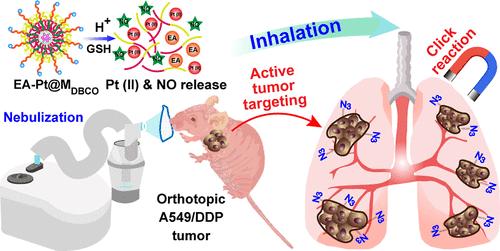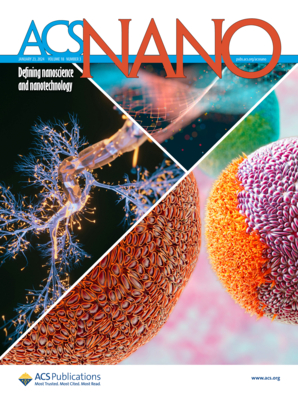生物正交化学引导的可吸入纳米药物规避异位非小细胞肺癌的顺铂耐药性
IF 15.8
1区 材料科学
Q1 CHEMISTRY, MULTIDISCIPLINARY
引用次数: 0
摘要
非小细胞肺癌(NSCLC)的特点是侵袭性强、预后差,而抗癌治疗药物的肺部给药在治疗非小细胞肺癌(NSCLC)方面表现令人鼓舞。顺铂是 DNA 烷化剂家族的重要成员,在 NSCLC 治疗中被广泛使用。然而,化疗耐药性的产生和副作用的出现严重阻碍了以顺铂为基础的化疗的长期应用。在此,我们提出了一种基于生物正交化学与吸入方法相结合的精准治疗顺铂耐药 NSCLC 的有效策略。为了克服顺铂化疗耐药性,我们合成了铂原药(IV)乙拉铂(EA-Pt),并将其封装在含一氧化氮(NO)的胶束中。通过对该纳米平台(EA-Pt@MDBCO)中的生物正交分子进行进一步修饰,在通过吸入预标记叠氮化物后,可提高对肺癌区域的靶向性能。EA-Pt进入酸性癌细胞后,由于生物正交胶束对pH值的敏感性而迅速释放,使其具有抑制谷胱甘肽S-转移酶活性和消耗细胞内谷胱甘肽的双重功能,最终逆转顺铂耐药性。此外,释放的 NO 还能改善对 NSCLC 的整体治疗效果。因此,用叠氮化物预标记的可吸入EA-Pt@MDBCO能有效抑制顺铂耐药的正位NSCLC的进展,为扩大NSCLC的治疗选择提供了一种可行的纳米策略。本文章由计算机程序翻译,如有差异,请以英文原文为准。

Bioorthogonal Chemistry-Guided Inhalable Nanoprodrug to Circumvent Cisplatin Resistance in Orthotopic Nonsmall Cell Lung Cancer
Pulmonary delivery of anticancer therapeutics has shown encouraging performance in treating nonsmall cell lung cancer (NSCLC), which is characterized by high aggressiveness and poor prognosis. Cisplatin, a key member of the family of DNA alkylating agents, is extensively employed during NSCLC therapy. However, the development of chemoresistance and the occurrence of side effects severely impede the long-term application of cisplatin-based chemotherapies. Herein, we propose a meaningful strategy to precisely treat cisplatin-resistant NSCLC based on the combination of bioorthogonal chemistry with an inhalation approach. Ethacraplatin (EA-Pt), a platinum prodrug (IV), was synthesized and encapsulated in nitric oxide (NO)-containing micelles to overcome cisplatin chemoresistance. By further modifying bioorthogonal molecules in this nanoplatform (EA-Pt@MDBCO), an improved targeting performance toward pulmonary cancerous regions is achieved after prelabeling with azide via inhalation. Upon entering acidic cancer cells, EA-Pt is swiftly released due to the pH sensitivity of bioorthogonal micelles, which enables its bifunctions to inhibit glutathione S-transferase activity and deplete intracellular glutathione, eventually reversing cisplatin resistance. Moreover, the released NO also improves the overall therapeutic outcome against NSCLC. Consequently, inhalable EA-Pt@MDBCO prelabeled by azide effectively inhibits the progression of cisplatin-resistant orthotopic NSCLC, offering a feasible nanostrategy to expand the treatment options for NSCLC.
求助全文
通过发布文献求助,成功后即可免费获取论文全文。
去求助
来源期刊

ACS Nano
工程技术-材料科学:综合
CiteScore
26.00
自引率
4.10%
发文量
1627
审稿时长
1.7 months
期刊介绍:
ACS Nano, published monthly, serves as an international forum for comprehensive articles on nanoscience and nanotechnology research at the intersections of chemistry, biology, materials science, physics, and engineering. The journal fosters communication among scientists in these communities, facilitating collaboration, new research opportunities, and advancements through discoveries. ACS Nano covers synthesis, assembly, characterization, theory, and simulation of nanostructures, nanobiotechnology, nanofabrication, methods and tools for nanoscience and nanotechnology, and self- and directed-assembly. Alongside original research articles, it offers thorough reviews, perspectives on cutting-edge research, and discussions envisioning the future of nanoscience and nanotechnology.
 求助内容:
求助内容: 应助结果提醒方式:
应助结果提醒方式:


